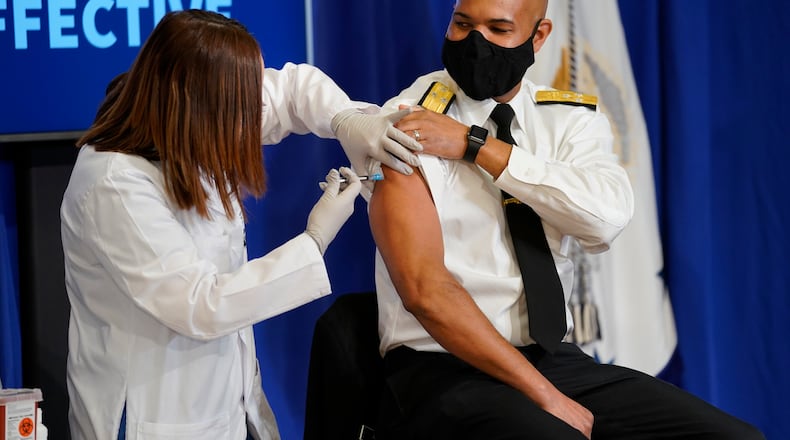“(It) does not appear that number that we’re now being told -- (it) is not going to slow us up in regard to the nursing homes,” he said. “We are on track there.”
The pharmacy companies distributing the vaccines in Ohio to long-term care facilities such as nursing homes estimate it will take about three to four weeks to distribute vaccines once they receive them, DeWine said.
According to a newly unveiled dashboard from the Ohio Department of Health, as of Saturday, 4,536 Ohioans had received the first dose of coronavirus vaccine, a two-dose regiment. That’s less than 1% of the state’s population.
The remarks came during a press conference held Saturday after Adams met with DeWine and other Ohio leaders virtually to discuss Ohio’s pandemic mitigation efforts and plan for vaccine distribution.
“As the governor said, it is our desire, our commitment, our goal from the federal level to get as much vaccine out as quickly as we can,” Adams said. “I want people to understand this is the biggest logistical undertaking from a public health perspective, likely in modern history ... And we still are on track, especially with emergency authorization of the Moderna vaccines we just heard about in the last 24 hours, which will increase the expected vaccine allocations next week.”
The Food and Drug Administration authorized emergency use of the COVID vaccine produced by Moderna on Friday.
Adams said the country is on track to deliver approximately 20 million doses of the two vaccines by the end of the month to states. During a press conference Saturday morning, U.S. General Gustave Perna, COO of Operation Warp Speed, said the distribution of those doses will continue into the first week of January.
Ohio is scheduled to receive a shipment of 201,000 Moderna vaccines on Tuesday and 89,000 from Moderna by the end of December. The first shipment will go to 98 hospitals and 108 health departments to vaccinate frontline workers. Premier Health expects nearly 6,000 doses of the vaccine next week and Public Health-Dayton & Montgomery County is anticipating it will receive about 3,100 doses.
In response to reports that hospitals elsewhere in the country have been accused of not equitably distributing their allotted vaccines to the frontline employees who need it most, DeWine and Adams said they have trust in the hospital systems.
“We made it very clear who’s supposed to get it,” DeWine. “We have trust in hospitals and we think that it’s going to go well. Is it possible that in some cases, someone will get it, who doesn’t fall within that category, yes, I suppose it certainly is very possible. But we also have an obligation to get this out, very effectively, efficiently and quickly. And so micromanagement at a high degree is not what is called for (when) trying to save lives.”
Adams agreed micromanagement would slow the process down.
“You’re going to have one-offs,” Adams said. “This vaccine is in high demand and we have to give some flexibility to people on the local level ... But it’s important to also understand that every hospital in every state is going to have to make tough decisions and sometimes different decisions. A physician who’s not caring for patients that are known to have COVID is not necessarily not caring for any patient with COVID ...”
Also Saturday, DeWine announced that the U.S. Department of Health and Human Services approved a waiver Saturday morning allowing the Ohio National Guard to administer vaccines to the general public.
About the Author

